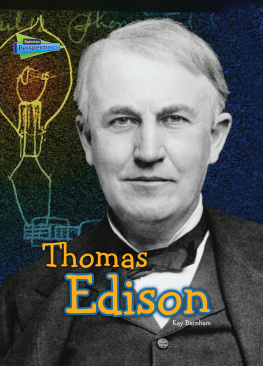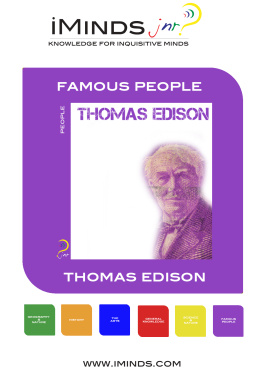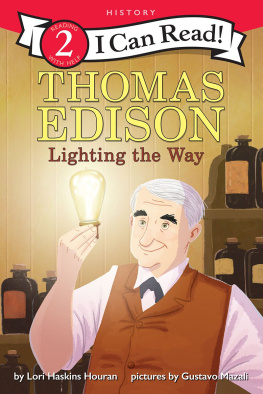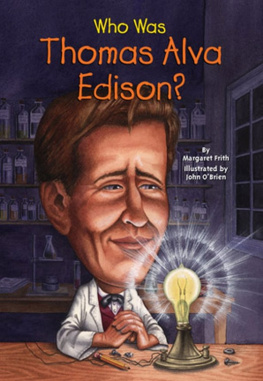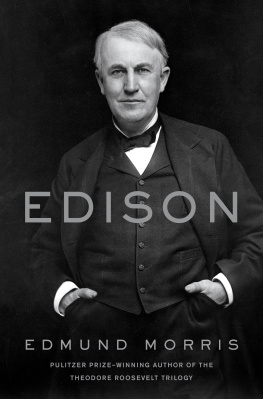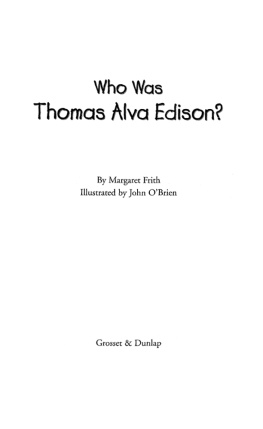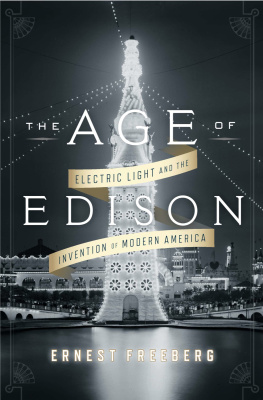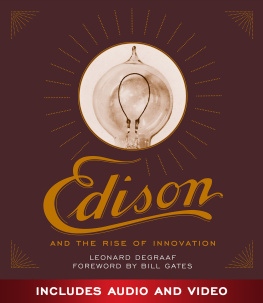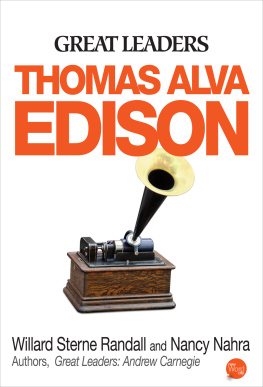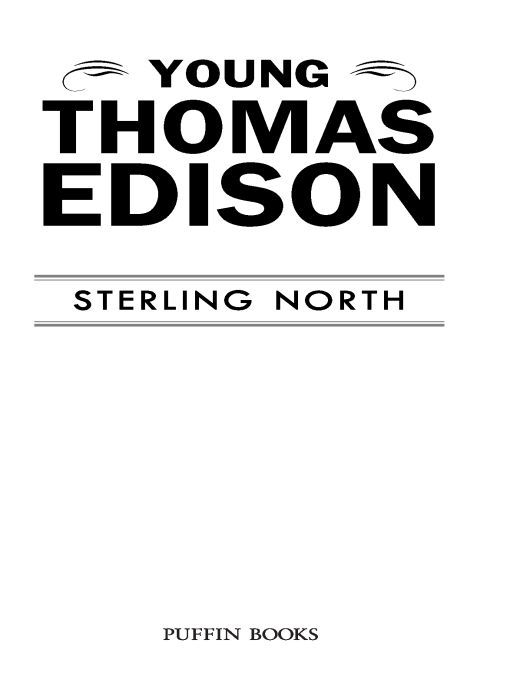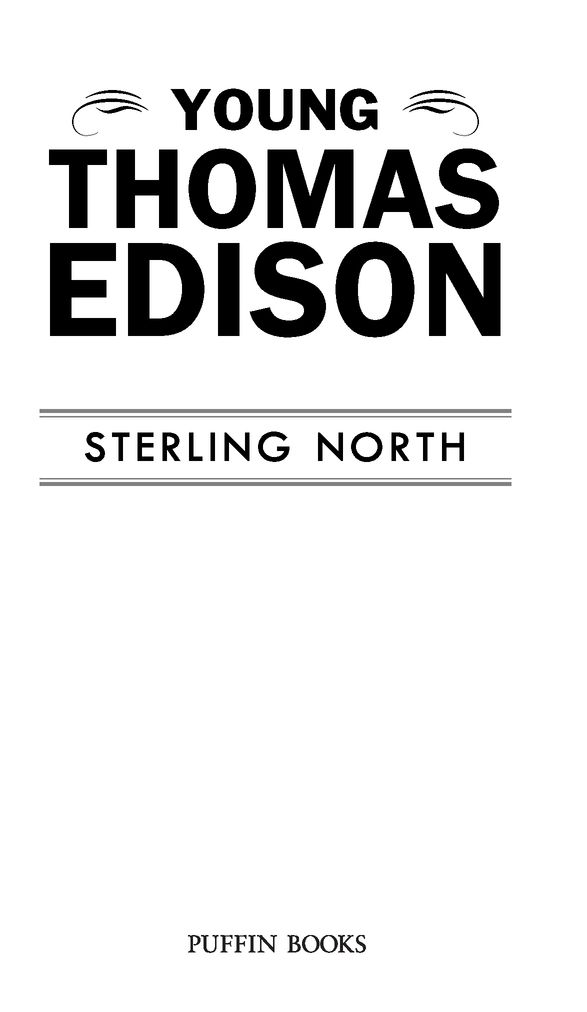Table of Contents
EARLY EXPERIMENTS
If Thomas Alva performed all the experiments in the book he must have performed one so dangerous that it should never be attempted except under the watchful eye of a trained adult scientist. Perhaps Al was wise enough not to fill a little cardboard house with hydrogen gas and to touch it off with a spark of electricity. He might have burned the Edison home to the ground. Some such event at about this time, however, aroused his mothers concern. Nancy did not like the popping sounds she heard from the basement, nor did she like some of the smells, particularly when Al was experimenting with sulphur. So she put her foot down firmly, telling her son to clean out the whole mess.
Al pleaded tearfully for his precious laboratory. His mother finally weakened, insisting, however, that he promise never to try a really dangerous experiment. She also insisted that all the poisonous chemicals be labeled. Al gladly complied. On each of 200 bottles he lettered POISON, adding a skull and crossbones. He knew the actual contents of each bottle, but the warning would serve to keep meddlers from touching his treasured chemicals.
READ THESE OTHER GREAT BOOKS
BY STERLING NORTH:
Mark Twain and the River
Rascal
The Wolfling
For
Arielle, Ole, and Little Randy,
with the love of the author
AUTHORS NOTE
In Young Thomas Edison, I have striven to bring back to life the inventor of the phonograph, the incandescent light, and motion pictures. Edison was one of the most human individuals who ever saved a childs life, roared with laughter over an amusing story, lost a fortune without bitterness, or courted his bride-to-be by tapping his message of love in the Morse code. Sharp-tongued and tender, whimsical and grim, playful and serious, his genius was only one side of his complex humanity. If I have made him live and breathe again for my young readers, I shall be satisfied.
I am particularly indebted to the staff of the Edison Laboratory National Monument of West Orange, New Jersey, for assistance in checking the scientific and historical aspects of this book. I wish to thank Melvin J. Weig, Superintendent, for suggesting the book in the first place, and for tireless labors in its behalf. I also wish to thank Norman Speiden and Harold Anderson, Curators of the museum, for their meticulous reading of the manuscript. If any minor error still remains, it is the fault of the author and not of the Edison Laboratory.
Sterling North
LET THERE BE LIGHT
When the wires go down in a big storm we are suddenly aware of an earlier, darker worldthe world before Edison perfected his incandescent light. We grope through the gloom with candles, our shadows looming large upon the wall.
It is as though the house were dead. No button or switch or dial responds to our touch. The television set is silent and dark. The little motors in our many household appliances refuse to turn. Refrigerators and freezers soon cease to be cold. Electric stoves and percolators and toasters give no heat. We huddle around the fireplace like cabin dwellers, aware that even the oil burner in the furnace cannot operate without its electric oil pump.
For a day or two this primitive existence is high adventure. But it is hard to keep clean without hot water. We strain our eyes trying to read by flickering yellow light. Soon we tire of this strenuous game of playing we are pioneers. It takes most of our energy merely to survive.
During thousands of years the human race lived among such shadowsdim caves, dim hovels, dim castles, damp and cold. No wonder so many tribes worshiped the sunlit torches, lamps, or candles at every festivity! Light is precious and hard to obtain, and darkness breeds fear, ignorance, and superstition. We step back centuries when the lights go off. And how grateful we are when those incandescent globes begin to glow again.
When Thomas Alva Edison died in 1931 at the age of eighty-four, he had more than one thousand inventions to his credit, including such miraculous ones as the phonograph and moving pictures. Of all his contributions to mankind, however, his greatest was his perfection of the electric bulbinexpensive, odorless, and dependablelight in such abundance that no monarch of the past could even imagine such luxury.
We are children of light! Without the suns warm and cheerful rays, we would swiftly die. Without electric light and power we would slowly slip back into a world of shadows. We honor the light-bringers of this worldthose who seek to banish ignorance and darkness. And this is the principal reason why Thomas Alva Edison has become one of the Americas most authentic heroes. He was a bringer of light!
THE COCOON UNFOLDING
Suppose... we show to the child... the cocoon unfolding, the butterfly actually emerging. The knowledge which comes from the actual seeing is worth while.
Thomas A. Edison
Even though it is the shortest month in the year, February has reason to be proud. It has given to America George Washington, Abraham Lincoln, and Thomas Alva Edison.
A blizzard was sweeping across Lake Erie on the midnight of which we are speaking. Drifts were piling deep around the brick cottage of Samuel and Nancy Edison in the village of Milan, Ohio. Now oil lamps began to glow through the frosted window-panes, and blue smoke swirled upward from the chimneys of the little house. A teen-age son, William Pitt Edison, was silhouetted for a moment in the lighted doorway, bundled warmly for his mission. Then the door was banged shut by the wind, and the boy plunged into the storm to bring Dr. Leman Galpinmuch needed at the Edison cottage on this particular night.
The cause of all this excitement was a new baby, soon to be christened Thomas Alva Edison. His arrival at three in the morning on the eleventh day of February, 1847, was characteristic of the strange hours he was to keep throughout most of his life. The baby was fair with gray eyes, and the very image of his mother. He seldom cried.
There in the little back bedroom of the cottage, tired Nancy lay beside her seventh child. Did she know the old superstition that a seventh offspring sometimes becomes a wonder-working wizard? Certainly this babys large and well-shaped head suggested intelligenceor so Nancy hoped, looking down fondly at her new infant.
Little Thomas Alva, known throughout his boyhood as Al, seems to have inherited much of his appearance and intelligence from Nancy Elliott Edison, the bright and pretty schoolteacher Samuel had married nineteen years before. Now at the age of thirty-seven, Nancy still retained some of her early beauty, the blue-gray eyes and chestnut hair, plus a smile both warm and wise.
Samuel Edison, a robust man of forty-three, looked down from his towering height upon his wife and newest child. His hair and beard were silver, and there was always a twinkle of merriment around his eyes. Although Thomas Alva would at first seem frail, eventually he would become a man of iron endurancehis fathers son in this respect at least.
On Nancys side of the family the blood was mostly Scots. On Samuels side it was largely Dutch.
As far back as the male line can be traced, the Edisons were vigorous, outspoken men who lived to a ripe old age. Usually they reared good-sized families of lively children. Samuel and Nancy got off to an excellent start in this respect, having, in fairly swift succession, three healthy babiesMarion, William Pitt, and Harriett Ann (known throughout life as Tannie). The family operated a clean little hotel in Vienna, Ontario; and here they might have spent their lives had not Samuel, like his grandfather before him, decided to risk his future by backing an unpopular and dangerous cause.


